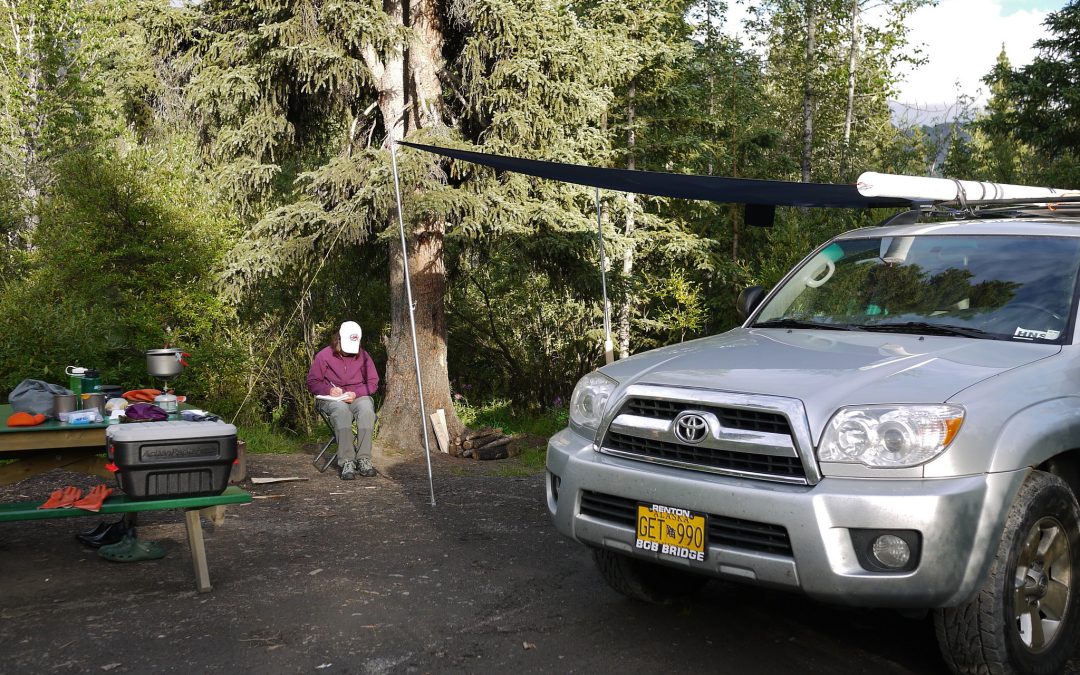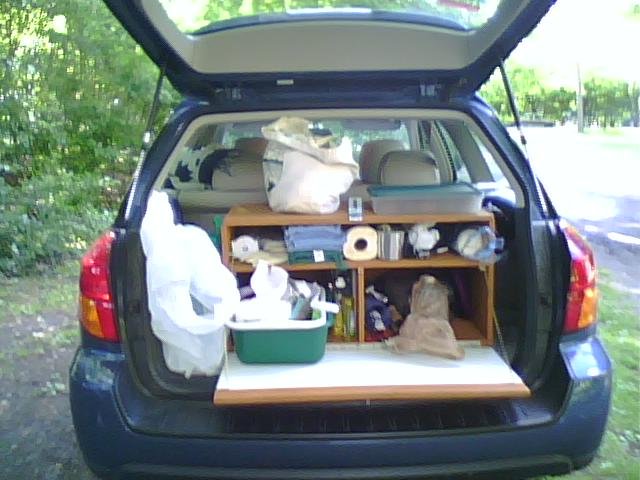As more people are embracing #vanlife, the internet is filled with inspiration for new setups and ideas. But if you’re not ready to fully commit to van life, car camping is a great alternative. Here’s a guide to car camping, complete with safety tips and ideas for creating a comfortable home away from home in your vehicle.
Privacy Is Key
One important aspect of car camping is ensuring privacy. This can help you relax and enjoy your time in the great outdoors. To create a private space, consider making a DIY window shade or setting up a wind tarp outside your tent.
Additionally, make sure your sleeping area is comfortable. With a car, you have more space to bring a larger tent and air mattress, so take advantage of this to create a luxurious camping experience. Choose your location wisely and have a solid safety plan in place, including emergency supplies and a first aid kit
Your Bed, Your Sanctuary
If you’re used to backpacking, car camping can feel luxurious because you have more space to make your sleeping area comfortable. With a car, you can bring your biggest and nicest tent and your cushiest air mattress, allowing you to truly relax and get comfortable at night. The extra room a car provides means you can bring all the necessary items to make your camping experience enjoyable.
Car Sleeping
If you are committed to sleeping in your car, make sure your vehicle is well- equipped for it. Test out different sleeping arrangements to ensure you will be comfortable. Choose a location where you will not be disturbed and consider using an app like The Dyrt to find the best camping spots. If you end up parking on an incline, arrange yourself so that your head is at the highest point of the car to prevent discomfort and illness.
Tent Sleeping
When camping in a tent, bring more blankets and pillows than you think you’ll need. If it ends up being warmer than expected, you can use them for extra cushioning underneath your sleeping surface. Also, be sure to test your air mattress or sleeping pad before your trip to ensure it doesn’t have any holes. This will save you the frustration of having to inflate it every night only to end up on the ground in the morning.
Staying Safe
It’s important to have a solid safety plan in place while camping, especially if you’re alone. Make sure to download offline maps of the area you’re camping in, bring a paper map as a backup, and share your live location with loved ones. Keep your phone charged and bring an extra set of car keys in case of emergencies. By being prepared, you can ensure a safe and enjoyable camping trip.
The Nitty-Gritty of Keeping Clean
Maintaining personal hygiene while camping can be challenging, especially if you’re far from modern amenities. One option is to take a baby wipe shower or visit a nearby campsite to use their facilities. Make sure to bring a small shovel and plenty of toilet paper and consider using a menstrual cup or period-proof underwear instead of traditional period products. By being prepared and staying clean, you can enjoy your camping trip without worrying about hygiene.
Finding a Place to Park
When looking for the perfect spot to park for the night, consider factors such as distance from civilization, accessibility, and special permits or fire bans. Do your research ahead of time and check in with the local ranger station for advice. It’s also best to arrive during the day to avoid setting up camp in the dark. By carefully choosing your location, you can ensure a safe and enjoyable camping experience.
Cooking Like a Pro
With car camping, you have the luxury of bringing all the gear you need to make your meals delicious and satisfying. Here are a few tips to help you plan and prepare your meals like a pro:
Bring nonperishable foods: Since you won’t have access to refrigeration while camping, it’s important to bring nonperishable foods that will last throughout your trip. This includes dried, freeze-dried, canned, or vacuum-sealed foods that don’t require refrigeration. You can even find powdered foods like potatoes that just need water to rehydrate them.
Test your food before your trip: Before you leave for your camping trip, it’s a good idea to test out the meals you plan to bring. This will help you avoid any unpleasant surprises when you’re in the middle of nowhere.
Plan your meals carefully: If you do bring perishable items, make sure to eat them first before they spoil. This is where a cooler comes in handy, as it can keep your food fresh for the first few days of your trip. Know how you’ll cook your meals: It’s important to check your campsite ahead of time to see if you’ll be able to have a fire for cooking. Even if you’re planning to cook over an open flame, you should still bring a camping stove and backup fuel just in case it rains or you’re unable to start a fire.
Bring plenty of water: Having your vehicle with you means you have plenty of room to bring more than enough water for cooking and hydration. This is an essential item to have on any camping trip.
Packing
Consider bringing a pair of comfortable walking shoes or hiking boots, depending on the type of terrain you will be exploring. It’s also a good idea to pack a hat, sunglasses, and sunscreen to protect yourself from the sun. And do not forget insect repellent, especially if you are camping in an area with mosquitoes. Finally, be sure to pack any essential medications or first aid supplies that you might need.
Leave No Trace
Leaving no trace behind is an essential part of enjoying the great outdoors on a camping trip. It means finding a spot that looks untouched, without trash, fire pits, or graffiti. Follow these tips to ensure that your campsite is clean and pristine when you leave:
Avoid creating trash in the first place: Before you start thinking about how to avoid leaving trash behind, consider how to avoid creating it in the first place. There are many reusable options for items like straws, cutlery, and storage bags. As the #zerowaste movement has grown, more companies are offering reusable alternatives to single-use items.
Stock up on these before your trip. Separate organic and inorganic waste: If you compost at home, you know what I mean. Separate fruit and vegetable scraps from plastics, paper, and other inorganic waste. Collect your compost in a separate container and dispose of it properly. You can even bury it under at least 8 inches of dirt, if it’s far from your campsite. Pack it in, pack it out: This is a common phrase that means whatever you bring with you, you take when you leave. This includes trash. Keep it in a bag or bin and take it with you until you can find a proper place to dispose of it. Before you leave your campsite, check for stray stakes or anything else you might have accidentally left behind.
In conclusion, car camping is a great way to enjoy the great outdoors without committing to a full-blown van life. With proper planning and preparation, you can have a safe, comfortable, and enjoyable experience. Remember to plan for privacy, safety, cleanliness, and leaving no trace of your presence. With these tips in mind, you’ll be ready to hit the road and enjoy your car camping adventure.
Resources
- REI’s Expert Advice on Car Camping: (https://www.rei.com/learn/expert-advice/car-camping.html) This comprehensive guide from REI, a well-known outdoor gear retailer, covers the essentials of car camping, from choosing the right gear to setting up camp and cooking.
- The Dyrt’s Top Car Camping Sites: (https://thedyrt.com/magazine/local/top-car-camping-sites/) The Dyrt is a popular camping app that helps users find the best campsites. This article lists some of the top car camping spots in the United States, complete with pictures and detailed descriptions.
- Leave No Trace’s Seven Principles: (https://lnt.org/why/7-principles/) Leave No Trace is a non-profit organization focused on promoting responsible outdoor recreation. Their seven principles provide guidance on how to minimize your impact on the environment while camping.
- Outdoor Project’s Car Camping Checklist: (https://www.outdoorproject.com/gear/car-camping-checklist) Outdoor Project is a website dedicated to providing information on outdoor adventures. This car camping checklist helps campers make sure they have all the necessary gear and supplies for a successful trip.
- Fresh Off the Grid’s Camp Cooking Tips: (https://www.freshoffthegrid.com/camp-cooking-tips/) Fresh Off the Grid is a website specializing in outdoor cooking and camping recipes. This article offers helpful tips for cooking delicious meals while car camping, including meal planning and food storage ideas.
In conclusion, linking to these authoritative and trustworthy resources will enhance the credibility of your car camping guide and provide your readers with valuable information to help them plan and enjoy their car camping adventures. By including these links and descriptions in your content, you are promoting a well-rounded and informative resource for car camping enthusiasts.
Featured Image Credit: Joseph/ flickr
In Post Image Credit: Brad P / flickr


